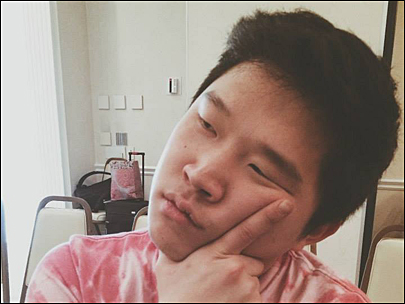In honor of Father’s Day, we’re posting some of our favorite stories about dads from the KoreAm archives. This piece appeared in our June 2008 issue.
by ED BOK LEE
During the last month my father was alive, I sat up with him during the evenings, trying to time the questions I’d for years been meaning to ask him about the Korean War, the Japanese Occupation, the toll these distant events had had on the man he’d become. He’d never mentioned these things to me, nor the older brother he’d lost. Nothing of his relatives or friends.
But looking at the scars scissoring up to his throat and the strain on his brow to keep the constant pain at bay, the idea now of probing, after so many years, felt invasive. I also remembered all the times he’d inquired about my life; how I’d only grunted the bare minimum in reply.
Then one evening, without warning, he spoke. It was one of those rare times, his insides at peace, when enough nutrients still flowed through his blood and brain to make him fully lucid.
I was looking through a sports magazine, taking in stats.
“Mom said you’re writing a novel,” he said, dry-mouthed, without opening his eyes.
“Just some poems,” I replied. He lay silent for a while. “Maybe if you grew up in Korea it could be easier,” he finally said. “What could be easier?”
“Everything.”
He swallowed, and began slowly moving the healing stone over his chest. My sister had given the object to him when he’d first been diagnosed with esophageal cancer several months earlier. At first, he’d scoffed at it, but now it seemed a natural extension of his hand.
“Still, you should marry a Korean girl,” he added.
Emboldened by this rare mood, or maybe sensing vulnerability opening between us, I asked him as gently as I could where he would want to be buried when the time came — a question my sister and mother had refused to even think about.
He opened his eyes, and considered it, as if for the first time, blinking at the ceil- ing.
“Maybe by water,” he finally said, closing his eyes again. “I don’t know.”
He grimaced from a sudden flare of pain.
To change the subject, I asked what he thought about all day. The good things. Here. Now. With his eyes closed most of the time. I suppose I was still hoping to hear something about his childhood.
“What gives you some, any kind of relief?”
After a moment, a faint smile eased the strain on his forehead.
“You know, fishing,” he said, without opening his eyes. The stone now lay motionless inside his fingers on his chest. “With you guys. So cute. All of us. Good things like that.”
A few days later my mother arrived from North Dakota, having quit the job she’d been holding on to for the health insurance. I left them alone, but listened to my father’s voice through the door — more plaintive with her now than ever with me. More frightened and childlike.
He told her about the problem he was having balancing his checkbook.
She asked him what he and I had been doing, of the trip to the clinic.
As I listened to their voices tenderly reconnecting, it suddenly occurred to me — not only how they were speaking, but what. Not the Korean they’d used with one another my whole life. Instead, now my mother would ask him questions in Korean, and he would answer in English. Or she might start something in English, and a Korean reply would come. But, more often, their sentences were jumbled — a strange, subtle dance between languages and cultures; all unconscious to either of them.
I’ve since heard that it’s perfectly natural to remember a dead loved one once or even several times a day for the rest of your life. Yet many people over time begin to feel indulgent for doing so. They begin to worry that it means they’re not letting go, moving on with their lives. Much needless guilt and suppression can result. Ironically, at the same time, it’s perfectly normal, after only a few short years, to begin to forget the most defining details comprising what the loved one truly looked like at the end of life. You always remember the person’s essence and personality, the spirit. But the particular face of all the faces they possessed over the years, as well as the voice at the time of death, begin to fade and blur into a lifetime of other memories of the person — replaced, finally, in recollection, by one general, vague impression of the person, devoid of any real specificity.
It’s a subtle, unconscious shift.
Like language. Culture. One period of history into the next.
I close my eyes and try to recall the first time he took me fishing.
My fingers slippery inside larger hands around one steadying rod.
This would be in Minnesota, possibly California, not likely North Dakota or Korea.
But I’m not sure anymore. Not even of the language we share.
It doesn’t really matter. Soon evening will lead us home.
ED BOK LEE is the author of Whorled, winner of an American Book Award, and a Minnesota Book Award, and Real Karaoke People, winner of a PEN/Open Book Award, and an Asian American Literary Award (Members’ Choice).
Photo by Flickr user Geordie Romer







